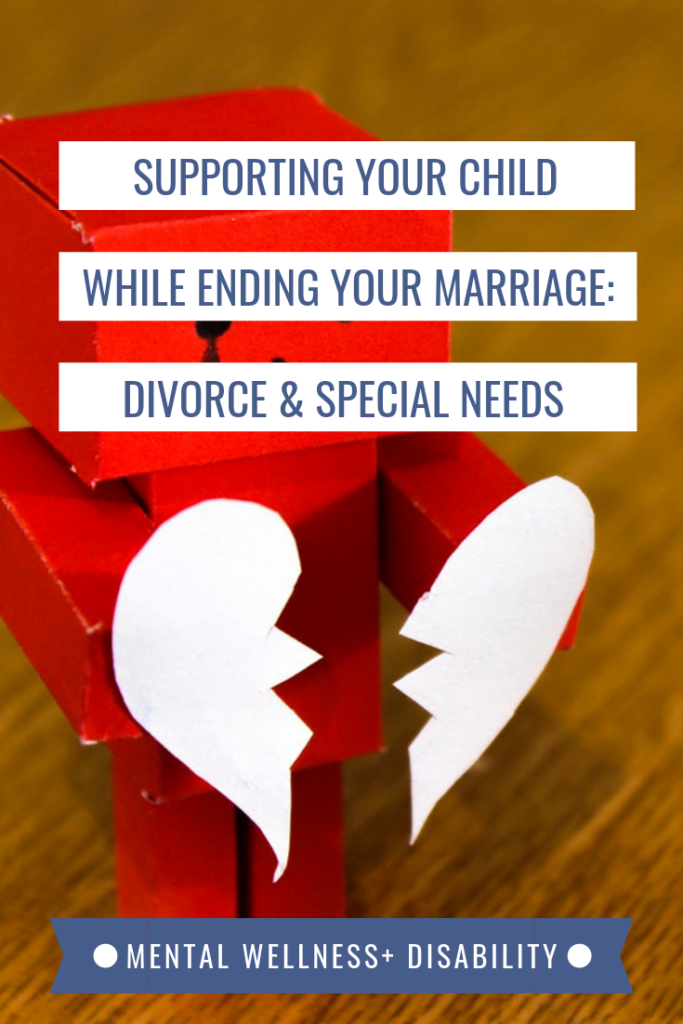While divorce is never easy, special needs parents who are divorcing or trying to manage co-parenting face some unique and exceptional challenges. This can make a painful situation feel overwhelming and at times downright impossible.
That’s why I’m so glad to share with you this guest post from Susan Ehrlich. Susan is a clinical social worker who has been practicing in Raleigh. North Carolina since 1989. She has worked for over 20 years with families and children who manage challenges including developmental differences such as learning differences, AD/HD, Autism Spectrum Disorders, and mood disorders such as anxiety and depression. She is a phenomenal resource to parents facing life transitions including divorce, as well as grief and other parenting difficulties. You can learn more about Susan’s private practice offerings here.  In this post, Susan answers questions you might have by sharing her best tips and resources for helping special needs parents make their divorce as painless as possible for their children.
In this post, Susan answers questions you might have by sharing her best tips and resources for helping special needs parents make their divorce as painless as possible for their children.

How can I tell my child with special needs that we are getting a divorce?
You and your spouse have made the difficult decision that your marriage is over. Now you have to figure out how to tell your child. This may be more painful than any other aspects leading to the dissolution of your relationship.
Know that there are things you can say and do to support this part of the process. As parents of a child with special needs, you’ll know the best developmental level of language to use.
General guidelines for telling your special needs child that you are getting divorced include:
- Make sure you’re certain that your separation is permanent and it’s highly unlikely you’ll get back together.
- Tell your child the same day or one day before a parent moves out; prolonged anticipation is unhelpful to children.
- Plan together what you’ll say so you can present in a united and gentle manner. Remember that you will continue to co-parent with your ex, so this is a good time to begin shared communication for the sake of your child.
- Call a family meeting and tell the child/children with both parents present. Indicate that separating is a choice that both parents have made and don’t offer an explanation why. Just state that from now on you have chosen to live in different homes.
- Use brief, concrete language and convey that your child will spend time with each of you in both homes. Tell your child that both parents will always love and care for him/her. Let your child know there’s nothing s/he did or didn’t do which caused this; it’s an adult decision.
- Model simple feeling words and don’t avoid the fact that this a difficult time. You might say “This makes me feel sad and even a little worried because it’s a change in our family”.
- Return to the fact that both parents will continue to love and take care of the child/children. Let him/her know about the things in his/her life which will remain the same: “You’ll see your friends at school”; “The kitty will be here at dad’s house”, etc.
How should we determine the best custody arrangement for our special needs child?
Determining physical custody is a difficult decision and will be based on what is best for the child, not for the adults. Parents will need to decide if their child can transition several times during a week or if s/he’ll do better remaining at one home for longer periods. T
here are different models of shared custody to help you decide which will be best for your child. You can visit this website to see different examples of custody schedules and consider what might work best for your family. Expect some challenges as you all adjust to the transitions and offer reassurance that mom and dad will figure out how to ease the difficulties.
How can we help our special needs child adjust to the transitions now that we’re divorced?
Here are a number of tips to consider as your family adjusts to transitioning between homes:
- It is helpful to use a visual schedule/calendar at each home with familiar symbols or pictures on each day (Mom/Dad, pictures of the pet at the home) so your child can see her schedule.
- When your child is not at your home, FaceTime, Skype, or daily phone calls become important methods to maintain connection. Check with the other parent about a good time to call, and help your child talk/see the other parent during FaceTime.
- If your child requires adaptive equipment you may want to have the equipment at each home rather than try to exchange it at the same time your child transitions.
- Another way to maintain to connection to your child is to attend therapy sessions and/or events at school. Some parents decide that the non-custodial parent will bring the child to speech/OT/PT so s/he experiences both parents’ active involvement in his/her routines. Seeing both parents together is comforting to children and while it may difficult at first, they adjust to going home with only one parent.
- Changes in sleep, eat, play, and some regression is not unusual. Keep your child’s teachers and other providers apprised of the family’s changes and get their report about how your child is doing, as children may maintain stability in their routine settings.
- Many parents find it helpful to set aside weekly (or more frequently) adult-only time to communicate in person or by phone.
- A joint calendar will be critical to let each parent know about school events, medical appointments, etc. Texts and emails, accompanied with pictures, can be helpful, but don’t rely solely on electronic communication.
- It’s in everyone’s best interest to support a positive relationship with the other parent. Your child will look to your reaction about how h/she is interacting with the other parent. The more you support hugs, connections, and warm exchanges the better your child’s adjustment will be.
- A co-parenting therapist can help if you are struggling with making decisions about parenting and communicating with your ex. They can guide you through working out parenting challenges in a neutral, therapeutic setting.
How can we meet our child’s emotional needs during and after the divorce?
Divorce is a disruptive major life event.
Be patient with the process of exchanges and transitions, since it’s unlikely you’ll get it “right” in the beginning. Expect big emotions and don’t try to diminish your child’s feelings.
Other ways to meet your child’s emotional needs as you all acclimate to your new patterns and activities include:
- Offer reassurance and reminders that both parents love him/her, and maintain consistent and loving support.
- Don’t assume every tantrum or upset is about the divorce. Keep your responses to unwanted behavior observational. You might say: “You’re upset that you have to go to bed and can’t finish the movie”, rather than, “I’m sure you’re upset that you can’t see mommy tonight”.
- A transitional object is a toy or preferred object (blanket, “lovey”) that your child brings with him/her to each home and can ease the changeover between homes.
- Be aware of your language and use supportive words such as “back-and-forth schedule, mommy’s house, daddy’s house”; don’t refer to one house as “home”.
- If behavioral and emotional concerns persist after 6-8 weeks, your child might benefit from professional guidance. Talk to your child’s pediatrician and/or seek consultation with an experienced child therapist. These healthcare providers can work with your child and both parents to provide additional support and recommendations.
What are some other resources that you recommend?
There are a lot of books for different ages and stages. I like these ones:
Familiar media can also help children understand the changes which come with divorce. This Sesame Street video is just one example.
What’s the most important thing for special needs parents who are divorcing to keep in mind?
Divorce is the end of your marriage but not the end of your family.
Remember when you learned about your child’s special needs and adjusted to that change? You will do so again and will help your child adjust to living with two parents in two homes.
Gain support for yourself so you can remain healthy, confident, and competent for your child. Your child will learn that families can change, grow and adjust and resume happy times.
I hope you’ve found Susan’s advice to be helpful (and I’m sure that you have!). Please use the social share buttons below to share this post with others who would benefit from her wisdom. If you have other tips to add, please feel free to share them in the comments!












